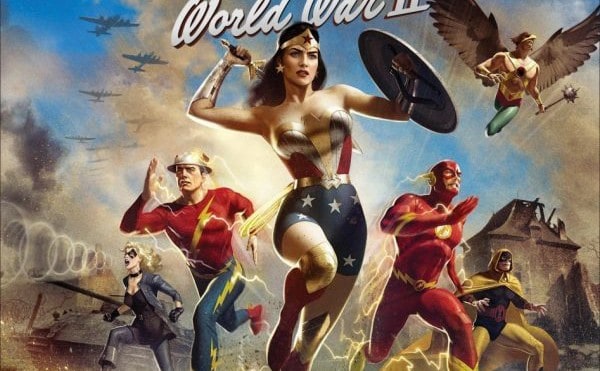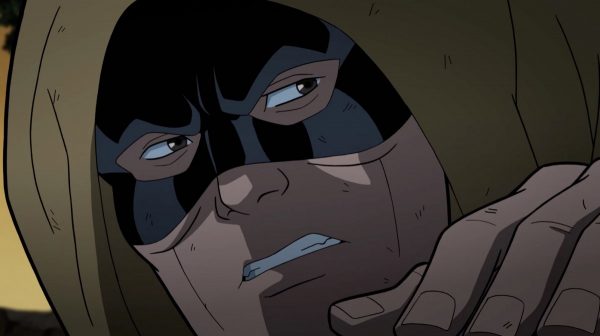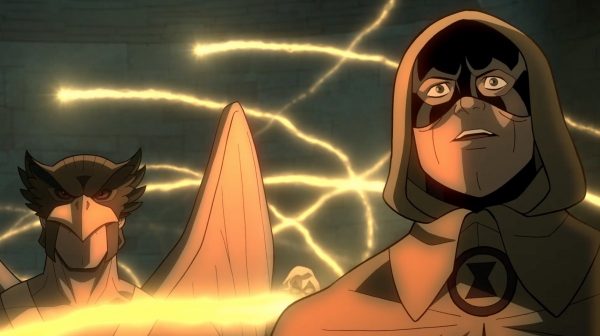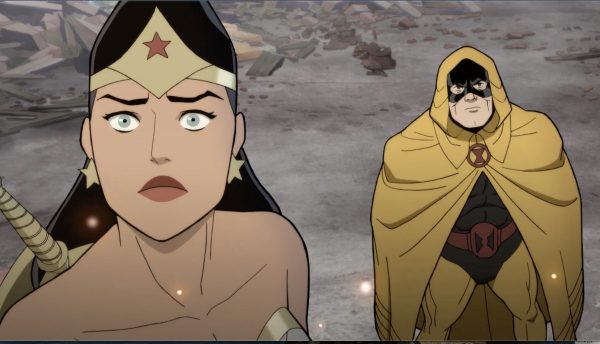Ricky Church chats with Justice Society: World War II star Matthew Mercer…
Though the Justice League consists of some of the most popular superheroes in comics and has been around for decades, they are not the first superhero team in either the DC Universe or the comic book industry. In 1940 the world was introduced to the Justice Society of America, a group of heroes made up of those with superpowers, scientists or highly skilled people who went on adventures, fought supervillains and even took part in World War II, fighting for the Allies against Nazi Germany and members of the Axis.
The original line-up included characters like Jay Garrick and Alan Scott, the original Flash and Green Lantern respectively, Hourman, Doctor Fate and Hawkman with Wonder Woman and Black Canary being added to the team later. While the Justice Society may not be as popular as the Justice League now, the JSA was a pretty big title for several years after its creation and remains a favourite among fans, so much so when DC wiped away the JSA out of continuity in their 2011 reboot many fans cried foul. In a few weeks the Justice Society will receive their first feature length animated adventure Justice Society: World War II, the latest film in DC’s line of original animated movies. It follows Barry Allen’s Flash as he accidentally travels back in time, landing in Nazi-occupied France and meets the Justice Society, a team of secret superheroes led by Wonder Woman. Flash teams up with them to uncover the Nazis’ latest scheme and find a way to travel back to his time.
We got to chat with Matthew Mercer who provides the voice of Rex Tyler aka Hourman, a scientist who develops a serum that gives him super strength for one hour, but leaves him unable to take it again for 24 hours. We chatted about Hourman’s heroism as the only non-superpowered member on the team, the film’s WWII setting and his process for working on new voices. We even briefly talked about one of his very first projects, the fan-made web-series There Will Be Brawl, a take of Nintendo’s characters which Mercer directed and played Ganondorf as well as voicing Kirby as a cannibalistic serial killer. Check out our interview below…
Ricky Church: In Justice Society: World War II you play Hourman. What drew you to this character?
Matthew Mercer: It’s really cool to be brought into a rich place like the DC animated universe to portray a character that really hasn’t been established. So many of these characters have been iconic for so long you’re kind of picking up a preexisting mantle and there’s a level of expectation and comparison. With this character I really get to establish them in this medium. So it was a huge honor. A little bit of pressure, I guess you could say, but it led to me to go down the rabbit hole of researching this Golden Age character that I knew a little bit about, but didn’t have as deep knowledge and kind of discovering this really interesting thread of humanity in him and finding ways to kind of make him really stand out amongst the rest of the JSA around him.
Yeah, for sure. Hourman is interesting because he’s kind of a scientist first and superhero second, but he seems to really enjoy the superhero aspect, especially since he’s the only non-superpowered member of the team. How did you tap into that aspect of the character?
I love the fact that we have a group of larger than life heroes and then in the middle of it, just a dude who’s a hero for an hour. It has a little Flowers of Algernon sense to it. The fact that you can, you have crafted, you have created a way to really embrace and become a demigod hero for a short time and then it’s taken from you. In that hour you can be really effective, but when you’re not in that hour you’re just another civilian really. The shift in identity there, the sense of still wanting to do good, to still fight for what you believe in and to see your friends still pushing and putting themselves out there, that decision that you would have to make of ‘Do I still put my very vulnerable self on the line and in danger for the purpose of something that I believe in’ and I think that in a way is its own heroism and a unique complex layer that isn’t given an opportunity to really explore in a superhero narrative. For me, a lot of that was the inspiration for the character’s grounding. I’m a huge science nerd. So, you know, the scientist aspect to it was an easy thing to tap into, but I think exactly what you said, that facet of being a normal human most of the time trying to do their best alongside superheroes is a really cool new way to look at a story.
Hourman is one of the oldest comic book characters being part of the first generation of Golden Age comics, but like you said he hasn’t really been tapped into a whole lot outside of that medium. Why do you think he and the rest of the Justice Society have remained so popular in the decades since?
I think some of it deals with the fact that in that time period, when there’s a lot of turmoil, when there’s a lot of challenges, when people are feeling like they lack control in a larger world, it’s wonderful to have stories of inspiration about people who have the power standing up for the little guy, to have figures that are willing to put themselves in the line of danger for the greater cause of those who can’t fight. During the time of World War II especially that is a very prominent point of inspiration. Those characters, when they hit the general zeitgeist at the time that makes a big impact, especially on a young generation that’s growing up through that. That gave them the staying power long enough for comics to begin to tackle more human issues and begin to kind of really show the dichotomy of heroes in the modern world as modern continued to change and as such the heroes adapted and adjusted as well. It’s a unique reflection of people, through these stories, wanting to feel like there are heroes in the world, wanting to feel like that they themselves can make a difference and maybe be their own hero when the time comes along. That resonates deeply in a lot of people’s stuff. That Golden Age definitely ticked off the idea of heroism vicariously through these characters and wanting to hopefully make a change in the ways that you can in the world around you.
For sure. You touched on it with that answer, but given the title obviously we’re in World War II. What was your reaction to reading the script and finding you guys are fighting Nazis as opposed to the typical supervillains?
Yeah. I mean, I’m always down to beat up some Nazis! Don’t get me wrong. WWII is in, some ways, historically a complicated time. I will never turn down the opportunity to play hero that gets to beat the crap out of Nazis. Especially when you go into ADR and we can actually see the fight scenes, see it being recorded, it all kind of come together. It was like all right, this is a little badge of pride I get to put on my belt.
Nice. You are a very prolific voice actor. You’ve worked on many, many projects throughout your career. How do you find the time and what is your process for finding something new to do vocally?
Finding the time? Well, it used to be driving actually before the pandemic hit. Driving for me was very much kind of my meditation, if that makes any sense. It was a period of time where I’d be alone in my car and I could just improvise dialogue and try out different vocal timbers and textures and characters and personalities and dialect. That was very much kind of my time to explore those facets of my toolbox. Since the pandemic started it’s been a little more challenging to drive or have a reason to drive anywhere. So for me it’s in the shower, it’s when my wife’s in a meeting in her office and will tease me for talking to myself for 30 minutes, just trying to find little pockets of time to practice and be my weird self when I’m alone in a room.
Awesome. Now Justice Society features a fairly big ensemble of heroes. You’ve got Wonder Woman, yourself, Hawkman, Black Canary, Flash. What did you think of being part of such a large cast?
That’s great. It’s a huge honour. You know, it really feels like an event when you have that many iconic figures part of a singular project like that. So it was really cool to be able to step into that space and be considered even remotely among all these incredible characters and actors who portrayed them and to be able to kind of have the opportunity to establish a character amongst that spectrum. Yeah, it’s a huge honour and I hope I did it justice.
I’m going to assume Hourman is your favourite JSA member, but do you have any other favourite members? If so, why?
It’s hard to not feel like I’m playing favourites, but I’ve always been a fan of Wonder Woman. Beyond just a cool design, I love the idea of there being a powerful, no-nonsense, female, fun leading hero, especially in a war time story. So much of that tends to be very male-driven classically through media. This is a Wonder Woman movie where we showed that does not have to be the case. Her as a character, especially in comics where it largely has been a very male-driven medium, a female character that has given the do to be a bad-ass, to be a leader and to be the one that kind of drives the heroic narrative is awesome. So I’m partial to Wonder Woman myself.
On an unrelated note to Justice Society, the very first thing I actually heard and saw you in way back was There Will Be Brawl, which I loved.
Oh my god! (laughs)
I loved that series and I realized that it turned 10 last year, I think?
Yeah. Oh god, I’m getting old.
What was that experience like for you?
That was my first major foray into directing any sort of live action production. For those who don’t know, it’s a web series that was super low budget. It was meant on a lark between me and a few friends and be shot at over a year and it was a lot of fun. It was very much the idea of a blood, sweat and tears project that none of us got paid at end of the day. It burned a hole in my savings, what meager savings I had. But we all got together as friends and made something that we believed in. We look back on it all still to this day very fondly. It built a lot of lasting friendships and I wouldn’t change it for anything. I’m so thankful we had that opportunity. Though we’ve all definitely improved our craft in many ways. It is still a very jenky production looking back on it because we were all starting and still just kind of figuring it out as we go. But you can’t deny that it had a heart and that makes us happy.
Thank you very much to Matthew Mercer for speaking with us!
SEE ALSO: Check out all of our Justice Society: World War II interviews here
Justice Society: World War II will be released on digital April 27th and Blu-ray May 11th.
Ricky Church – Follow me on Twitter for more movie news and nerd talk.

















